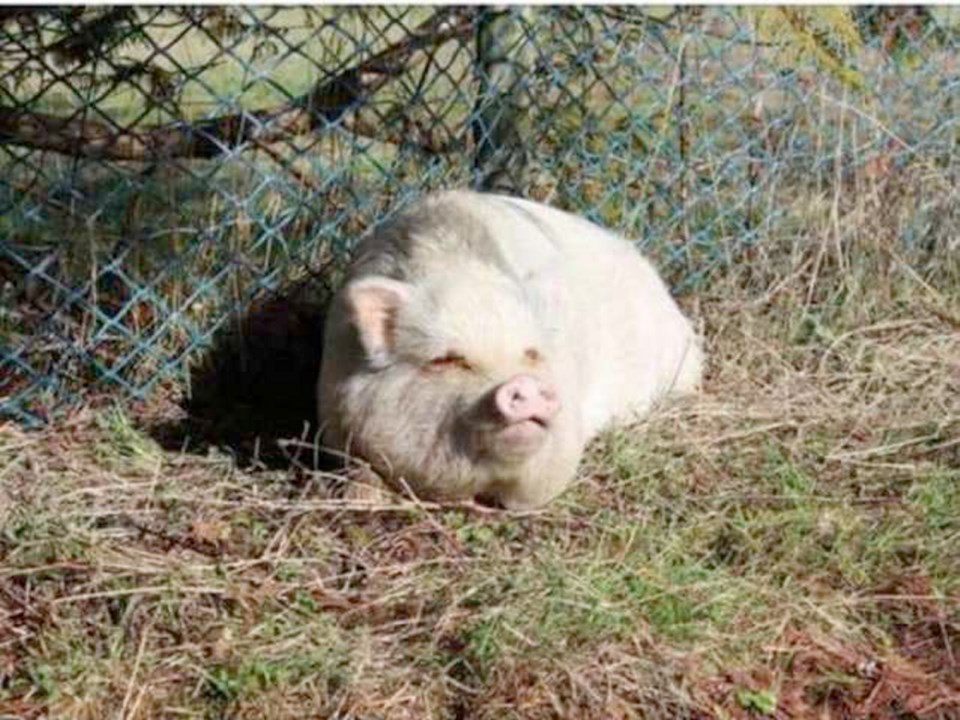Animal rescue groups are calling for better SPCA adoption policies after a rescued pot-belly pig was butchered and eaten by her new owners on Vancouver Island.
Molly was adopted in mid-January after spending several months at the Cowichan SPCA. She was among 23 pigs surrendered to the society in May after their owner was evicted from a property near Ladysmith.
This week, a social media post showing one of Molly’s new owners seasoning a slab of pork began to circulate online. Brandy Mckee, a pig owner from Lantzville, saw it.
“I was beside myself,” Mckee said. “These are pets. If this was a dog or a cat, people wouldn’t stand for it.”
B.C. SPCA spokeswoman Lorie Chortyk said the society is “extremely upset” by the pig’s death, but does not have the authority to lay charges against her new owners because it is legal to eat animals for food in Canada.
“Our staff conducted a thorough adoption counselling process and used an adoption form specifically designed for livestock,” she said.
“The adopter gave assurances, verbally and in writing, that their intent was to keep the animal as a pet.”
Because the adopter legally owned Molly, the society has no legal recourse except to ban the couple from adopting animals at SPCA branches across the province.
“With respect to animals and Canadian law, an owner has the legal right to end the life of their animal, regardless of species, as long as it is done humanely,” Chortyk said.
She was unable to say whether the society could go to court to enforce the adoption contract.
Lucie Cerny, founder of RASTA, a farm animal rescue group in Chemainus, was “horrified” by news of Molly’s death. She adopted two pregnant pigs that were seized by the SPCA at the same time as Molly.
“The blood and sweat and tears that goes into finding these pigs a home is incredible. For this to happen is beyond devastating,” she said.
Cerny compared pot-belly pigs with dogs and cats, saying they are cleaner and more intelligent than many other pets.
“I don’t believe Molly was killed because this couple was starving to death,” she said. “What’s the point of having an adoption contract if it can be disrespected and mocked without consequences?”
Michelle Singleton, founder of A Home for Hooves Farm Sanctuary Foundation in Duncan, wants the SPCA to improve adoption policies for pot-belly pigs to include home checks, as well as personal reference checks and some kind knowledge assessment to ensure adopters know how to care for pigs.
“More stringent adoption policies would ensure the pigs are going to proper owners,” she said. “Pot-belly pigs are absolutely wonderful animals, but they can be problematic if they are not raised in the proper environment.”
It is unclear if the couple paid an adoption fee for Molly or what kind of screening was done.
Pot-belly pigs were once trendy pets, with people paying up $1,500 for one when they first entered the North American market in the 1980s.
Many were given up for adoption after their owners realized the piglets eventually grew into large animals. In the U.S., thousands of unwanted pigs were slaughtered and turned into dog food.
Molly’s case bears some resemblance to one involving 16 goats and four sheep that were adopted from the Stanley Park petting zoo when it closed in 2011. A Langley hobby farmer sold the animals at auction, after which they were likely killed for meat.
The hobby farmer apologized and offered an out-of-court settlement after the Vancouver Park Board sued him for $12,000.



